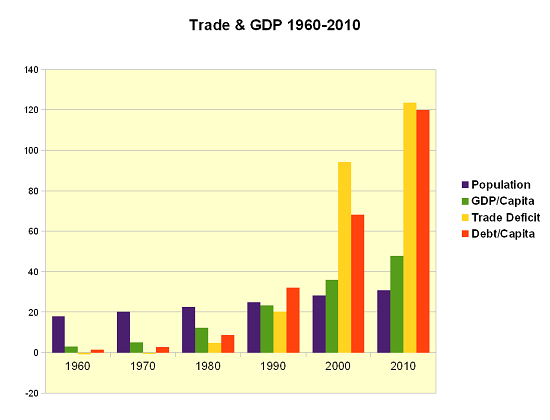
“Merchants have no country. The mere spot they stand on does not constitute so strong an attachment as that from which they draw their gains.” – Thomas Jefferson
There have been some really great articles recently attacking the deeply flawed ideology of free trade which are definitely worth your time to read through.
Pat Buchanan discusses what disastrous things the recent free trade agreement with South Korea is doing to our economy:
Well, courtesy of Martin Crutsinger of the Associated Press, the trade figures are in for April, the first full month under the trade deal with South Korea.
And, surprise! The U.S. trade deficit with Korea tripled in one month. Imports from South Korea jumped 15 percent to $5.5 billion in April, while U.S. exports to South Korea fell 12 percent to $3.7 billion. Suddenly, the U.S. trade deficit with Seoul surged to an annual rate of $22 billion.
Shades of NAFTA. When it passed in 1993, we had a $1.6 billion trade surplus with Mexico. By 2010, our trade deficit with Mexico had reached $61.6 billion. . . .
A deepening dependence on foreign nations for the necessities of our national life. A steady erosion of our manufacturing base. A continued stagnation in the real wages of the middle class. And an unending redistribution of America’s wealth to foreign lands.
It is no coincidence that the real wages of U.S. workers ceased to rise in the mid-1970s, just as a century of U.S. trade surpluses was coming to an end. . . .
Instead of a trade policy crafted for the benefit of multinationalist corporations, we need a new trade policy that puts America and Americans first.
Vox Day expanded Buchanan’s analysis with a look at some actual numbers and graphs:
Notice how adding the overall debt level of the economy completely changes the picture and makes it obvious how the trade deficit is impoverishing the USA despite the increase in GDP. GDP that does not account for debt is a terrible measure of wealth and every bit as misleading as GDP that does not account for inflation, as it is nothing more than a metric intended to track national income. Whereas per capita wealth, measured by GDP/capita – debt/capita was only -$1,417 in 1960, it has increased by two orders of magnitude to -$120,014. Debt that could once be paid off in 17 months would now require 42 months.
The prosperity that North and others claim free trade has brought the USA is nothing but a mirage and is the simple result of Americans borrowing to buy those foreign goods and services with money they will have to pay back from a smaller industrial base competing against much more serious competitors than they faced 50 years ago.
The case for free trade was always logically flawed, and on the empirical level simply cannot survive the incorporation of debt into the equation, as the historical statistics clearly demonstrate the intrinsic falsity that was always apparent to the sufficiently careful economic analyst. Free trade has not made the USA more wealthy, any more than buying giant houses with no-money down mortgages during the housing boom made those individuals who bought them rich. It hardly amounts to “state worship” to note that debt is not wealth. And it should be clear that by depriving the local consumers of their jobs and their ability to pay for imported goods and services, free trade necessarily requires either a decline in living standards or a constantly increasing debt load for countries on the red side of the trade deficit.
Vox then followed this up with a discussion about how much of modern devotion to the ideology of free trade is religious in nature:
The chief legacy of David Ricardo’s free-trade doctrine, beyond its pernicious utilization by globalists and fascistic, anti-democratic organizations such as the European Union, is one of intellectual dishonesty. In Europe and the Americas, every so-called free-trade agreement has been signed over the objection of critics who object, correctly, that the effects will be precisely the opposite of those promised by those pushing the agreements. From the European Coal and Steel Community to NAFTA and the recent trade agreement with South Korea, the real objectives and eventual results have been very different from those promised. As Pat Buchanan demonstrated in his recent column titled “We need more economic nationalists,” free-trade doctrine fails catastrophically every time it is forced to prove itself as a predictive model. . . .
There are a variety of perspectives from which the free-trade doctrine can be considered. But it must not be forgotten that Ricardo was not an economist in the modern sense, and his works were political economy. There are arguments for and against free trade that are purely economic and theoretical, but they must be carefully distinguished from those that are practical, political and even moral. And when the advocates of free trade assert the intrinsic perfection of free trade on a moral basis, it should be recognized that this is not an economic argument, but rather a religious one.
| Tweet |
|
|
|




